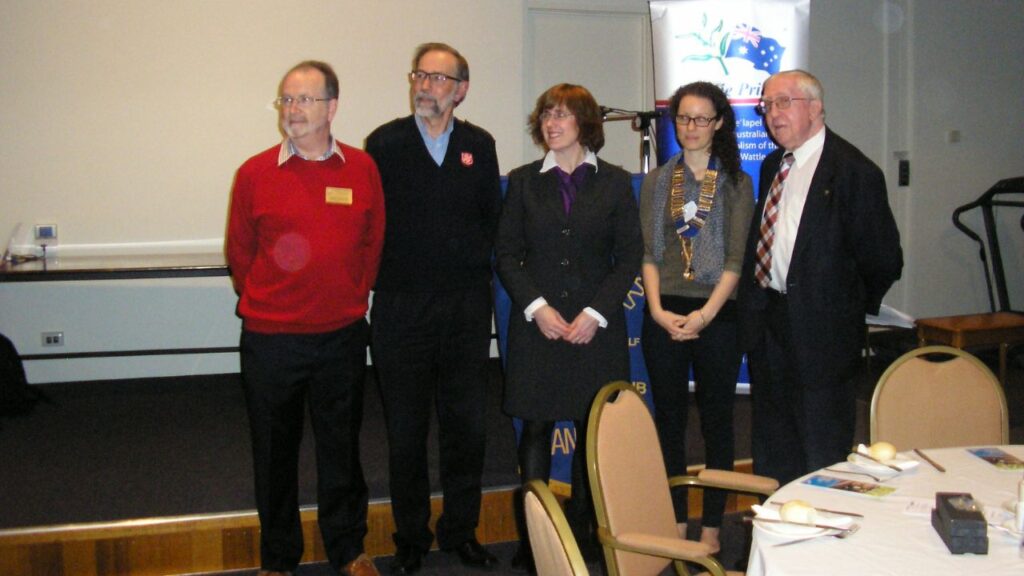Business Mentoring and its Growing Popularity for Rotary Club of Canterbury
Topic: Business Mentoring and its Growing Popularity
Date: 26 August 2013 6:00pm – 8:30pm
Organisation: Rotary Club of Canterbury
Venue: Conochie Hall, 2 Rochester Road, Canterbury, Victoria, Australia, 3126
Invitation from: John McCaskill
Audio: 36MB With an introduction to Montserrat Fernández Pera
Slides:
The Rotary Club of Canterbury is contemplating a new Mentoring Program so Sue Ellson was invited to share her insights of working with newcomers, migrants, expatriates and repatriates with the group.
Neil Williams – Meeting Chair for Rotary Club of Canterbury
Norman Gale – Director of Community Engagement of Camberwell Corps, Eastern Victoria Division for The Salvation Army
Sue Ellson – Founder and Director of Newcomers Network
Melanie Burgess – Coordinator for L2P Learner Driver Mentor Program
John McCaskill – President of Rotary Club of Canterbury
Text from Powerpoint Presentation:
1. Business Mentoring and its Growing Popularity by Sue Ellson sueellson [at] sueellson.com +61 402 243 271 Monday 26 August 2013 http://www.canterburyrotary.org
2. Sue Ellson Background
Newcomers Network, Global Mobility Network, Camberwell Network, Sue Ellson, Australian Human Resources Institute International Human Resources Management Network, St Paul’s Anglican Church Canterbury, Camberwell Centre Association, 2013 Concerts in Canterbury
3. Business Mentoring and its Growing Popularity
• Mentoring or Coaching
• Online and in person
• Apprenticeships, Peer to Peer, Supervisor, Program Based
• Provided privately, by council / government, professional associations and not for profits
• Popular with experienced professionals
• Variety of models
4. Program Components
• Clear purpose and direction
• Clear outcomes for both mentors and mentees
• Clear training and structure
• Clear commitment for both parties
• Clear goals
• Clear definitions (risk covered)
5. Mentor Components
• Clear understanding of the program
• Mentor training to understand the guidelines
• Mentor training to be effective
• Mentor training to be up to date
• Mentor supervision
• Reporting back to the group
6. Mentee Components
• Free start • Financial or consequence outcome to continue
• Regular timing (both online and offline)
• Regular comparison to goals
• Recording of changed goals
• Working with other mentors
• Access to additional opportunities
7. Sourcing Mentors
• Club Members – trained
• Friends of Rotary – also trained
• Locals – existing Rotary related relationships
• Locals – new relationships
– warm up
– gentle transition, defined commitment
– training based
– mentoring begins
8. Sourcing Mentees
• Newcomers – specific needs
• Locals – existing Rotary related relationships
• Locals – new relationships
– warm up
– gentle transition, low commitment
– training based
– mentoring begins What is the aim of your program?
9. Case Studies Programs
• Skilled Migrants into Work
• Brazilian Professionals English Improvement
Techniques
• Finding a mentor
• Keeping it sustainable
• Measuring your return on investment
• Matching it to existing programs
10. Questions
• Online tools
• Scalable options
• Training topics
• Realistic numbers
• Networking and experience
• Stakeholders
• Checking in – how to learn and grow, and any barriers to results
Shared online on Presentations Page
